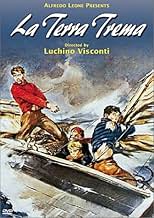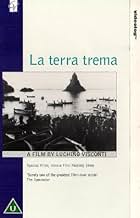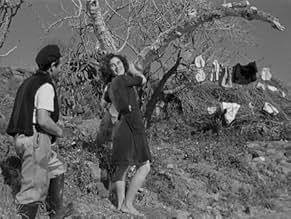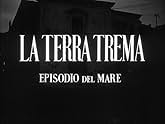VALUTAZIONE IMDb
7,8/10
5942
LA TUA VALUTAZIONE
Nella Sicilia rurale, i pescatori vivono in balia degli avidi grossisti. Una famiglia rischia tutto per acquistare la propria barca e operare in autonomia.Nella Sicilia rurale, i pescatori vivono in balia degli avidi grossisti. Una famiglia rischia tutto per acquistare la propria barca e operare in autonomia.Nella Sicilia rurale, i pescatori vivono in balia degli avidi grossisti. Una famiglia rischia tutto per acquistare la propria barca e operare in autonomia.
- Regia
- Sceneggiatura
- Star
- Premi
- 1 vittoria e 1 candidatura in totale
Luchino Visconti
- Narrator
- (voce)
- (non citato nei titoli originali)
Antonio Pietrangeli
- Narrator
- (voce)
- (non citato nei titoli originali)
Antonio Arcidiacono
- Ntoni
- (non citato nei titoli originali)
Giuseppe Arcidiacono
- Cola
- (non citato nei titoli originali)
Venera Bonaccorso
- La vecchia che ride
- (non citato nei titoli originali)
Nicola Castorino
- Nicola
- (non citato nei titoli originali)
Rosa Catalano
- Rosa
- (non citato nei titoli originali)
Rosa Costanzo
- Nedda
- (non citato nei titoli originali)
Alfio Fichera
- Michele
- (non citato nei titoli originali)
Carmela Fichera
- La baronessa
- (non citato nei titoli originali)
Rosario Galvagno
- Don Salvatore, il maresciallo dei carabinieri
- (non citato nei titoli originali)
Agnese Giammona
- Lucia
- (non citato nei titoli originali)
Nelluccia Giammona
- Mara
- (non citato nei titoli originali)
Ignazio Maccarone
- Maccarone
- (non citato nei titoli originali)
Giovanni Maiorana
- Un bambino
- (non citato nei titoli originali)
Antonino Micale
- Vanni
- (non citato nei titoli originali)
Maria Micale
- La madre
- (non citato nei titoli originali)
Recensioni in evidenza
1. This movie is likely to excruciate those who are not used to reading fast, because the images are too great to be sacrificed for subtitles. Even most of the Italian-speaking people have a hard time understanding this Sicilian accent.
2. The other reason why La terra trema is found boring by many is that reality matters much more than drama to the neorealist director Luchino Visconti. So the audience shouldn't be passive while seeing some real lives going on, that is the only way to feel engaged.
3. The most notable advantage of the movie comes to attention right here. It is touching without bending over backwards for that purpose. You can feel connected to it and at the same time wonder where all that connection comes from. (The movie does not try hard to make you feel this way) It shakes your deepest emotions simply because all it has to do with is the reality of a human society, and also with the real nature for that matter.
4.Another important point here is Visconti doesn't let the fact that he believes in Socialism affect the reality of what he is portraying. The hammer and sickle on the wall in no way seems anything other than part of a neutral report. He reminds us of those journalists who succeed in providing us with an unbiased report regarding a massively resented dictator when we are pretty sure the journalist hates the dictator as much as we do.
5. All in all this is a great picture , of course it requires active audience who know what they want to get from the almost sheer reality pictured.
2. The other reason why La terra trema is found boring by many is that reality matters much more than drama to the neorealist director Luchino Visconti. So the audience shouldn't be passive while seeing some real lives going on, that is the only way to feel engaged.
3. The most notable advantage of the movie comes to attention right here. It is touching without bending over backwards for that purpose. You can feel connected to it and at the same time wonder where all that connection comes from. (The movie does not try hard to make you feel this way) It shakes your deepest emotions simply because all it has to do with is the reality of a human society, and also with the real nature for that matter.
4.Another important point here is Visconti doesn't let the fact that he believes in Socialism affect the reality of what he is portraying. The hammer and sickle on the wall in no way seems anything other than part of a neutral report. He reminds us of those journalists who succeed in providing us with an unbiased report regarding a massively resented dictator when we are pretty sure the journalist hates the dictator as much as we do.
5. All in all this is a great picture , of course it requires active audience who know what they want to get from the almost sheer reality pictured.
Although it was supposed to be a documentary, Visconti put in a slight story line to achieve what a documentary would have done, AND MORE. --He used no professional actors, just native Sicilian fishermen, and other villagers, to play all parts. -- The film uses no artificial lighting, no sound enhancement, sound-effects, or dubbing. -- It was filmed on location in, and around, the crumbling homes of the poor villagers, and it was recorded in the Sicilian dialect (rather than proper Italian), and although it has a documentary "look", Visconti shows the exploitation of the poor by the capitalist middlemen so much more effectively than any documentary could have done.
-- Also, while not the first neo-realist film of that post-war Italian genre, this was the first film to be described by the term: "neo-realist". --A brilliant film on all counts. I rated it "10".
-- Also, while not the first neo-realist film of that post-war Italian genre, this was the first film to be described by the term: "neo-realist". --A brilliant film on all counts. I rated it "10".
I saw this movie Friday night on TCM. I'd never heard of it, but I'm a neorealismo fan, so I watched. I'm sorry I didn't tape it, what an epic! Like "The bicycle thief," this movie uses real people, and almost feels like a documentary at times. I agree that the sentiments are rather marxist, but I have to admit that if I lived as these people do, I might be drawn to communism, too. There are some subtle (or maybe not so subtle) references to the politics of the times, wall posters about Mussolini and the hammer and sickle images painted on the walls. Oddly, this movie reminded me somewhat of "Man of Aran," the images are that stark, life is that bleak. The film is beautifully shot, and the story is wrenching. Watch it if you get the opportunity. It memorializes a way of life that is gone, and I'll bet there's not a single person who misses it.
Luchino Visconti's epic on a family living in the Sicilian fishing village of Trezza, the Valastros, is a compelling story, told with sincerity and skill, and for the outsider viewing into their world it's at the least interesting and at its most heart-felt is rather affecting. Narrators Visconti and Antonio Pietrangeli themselves are outsiders to the world of dirt-poor fishermen who work their entire lives to earn pittance for the wealthy wholesalers (it's based on a novel, I Malavoglia- translated as Ill Will- by Giovanni Verga).
Their narration can hint the audience member on little details that wouldn't be known from the characters, however sometimes their voice-over, in such a documentary style (before this Visconti was among a group of directors for a documentary during world war 2 that is not listed on this site but it mentioned in the documentary My Voyage to Italy) can be a little deterring as they mention certain emotions the characters are feeling that we as the audience can determine right in the eyes.
The story tells of the Valastros, in particular 'Ntoni, an idealist who returns from fighting in the war with a much different view of the environment around him than what his elders would want to believe. Unlike his grandfather, who has worked for the wholesalers and not earned and saved a cent more or less than his children, he wants change in the way things are done, and soon gets enough money to build his own boat and to sell his own fish.
Things look optimistic, until nature intervenes in destroying the boat, leaving 'Ntoni without a job, the wholesalers laughing at him mercilessly and little by little loosing any respect he had in the village. His other family members also get time on the screen- two sisters who want to meet a man to marry, and how one is at the will of God and the other is at the will of the Don of the village, Don Salvatore; also a brother, who after losing his job becomes a smuggler bringing in cigarettes. Their stories, in a pacing that may have some wondering when it will end and some wondering if it can go on longer, lead up to a heartbreaking climax for each of them.
I learned shortly after viewing La Terra Trema that Luchino Visconti (I suppose it shouldn't have been much of a surprise considering the state Italy was in before, during, and after the war) was a lifelong member of the Communist party despite being raised in a wealthy environment in Northern Italy. While I had a feeling there was something about the way Visconti depicted the Volostros and the nature of the people and the village that seemed "for the working man", but I didn't really feel that the political intonations were a crutch to the overall execution of the film. Since one of the pin-points of neo-realism is to tell things as simply as they unfold in real life, no matter how downtrodden it can get, the focus of the fishermen versus the wholesalers is made more as a reflection of basic good versus evil, and it can appeal to those who don't want a strict tale of classes.
Its humanity is what shines through, and that is what should appeal to connoisseurs of neo-realism and Italian filmmaking; while I can't quite recommend it as much as The Bicycle Thief or Open City, I can recommend it as the first film people should see if they want to know and understand the work of Visconti, his operatic intonations with his players a graceful counterpart to his documentary techniques.
Their narration can hint the audience member on little details that wouldn't be known from the characters, however sometimes their voice-over, in such a documentary style (before this Visconti was among a group of directors for a documentary during world war 2 that is not listed on this site but it mentioned in the documentary My Voyage to Italy) can be a little deterring as they mention certain emotions the characters are feeling that we as the audience can determine right in the eyes.
The story tells of the Valastros, in particular 'Ntoni, an idealist who returns from fighting in the war with a much different view of the environment around him than what his elders would want to believe. Unlike his grandfather, who has worked for the wholesalers and not earned and saved a cent more or less than his children, he wants change in the way things are done, and soon gets enough money to build his own boat and to sell his own fish.
Things look optimistic, until nature intervenes in destroying the boat, leaving 'Ntoni without a job, the wholesalers laughing at him mercilessly and little by little loosing any respect he had in the village. His other family members also get time on the screen- two sisters who want to meet a man to marry, and how one is at the will of God and the other is at the will of the Don of the village, Don Salvatore; also a brother, who after losing his job becomes a smuggler bringing in cigarettes. Their stories, in a pacing that may have some wondering when it will end and some wondering if it can go on longer, lead up to a heartbreaking climax for each of them.
I learned shortly after viewing La Terra Trema that Luchino Visconti (I suppose it shouldn't have been much of a surprise considering the state Italy was in before, during, and after the war) was a lifelong member of the Communist party despite being raised in a wealthy environment in Northern Italy. While I had a feeling there was something about the way Visconti depicted the Volostros and the nature of the people and the village that seemed "for the working man", but I didn't really feel that the political intonations were a crutch to the overall execution of the film. Since one of the pin-points of neo-realism is to tell things as simply as they unfold in real life, no matter how downtrodden it can get, the focus of the fishermen versus the wholesalers is made more as a reflection of basic good versus evil, and it can appeal to those who don't want a strict tale of classes.
Its humanity is what shines through, and that is what should appeal to connoisseurs of neo-realism and Italian filmmaking; while I can't quite recommend it as much as The Bicycle Thief or Open City, I can recommend it as the first film people should see if they want to know and understand the work of Visconti, his operatic intonations with his players a graceful counterpart to his documentary techniques.
Luchino Visconti was a great Italian master director who along with Roberto Rossellini and Vittorio De Sica, is regarded as one of the pioneers of Italian Neorealism. 'Ossessione' was Visconti's first film and in some quarters it is hailed as the first neo-realist film ever made. Whether 'Ossessione' should be considered a neo-realist film or not is debatable, but if ever a film epitomised the Italian neo- realist experience, in my mind it is 'La Terra Trema'(along with a few others). It tells the story of the exploitation of the working-class fishermen in Aci Trezza by focusing on one particular family, the Valastros.
There are some films where the philosophies and sensibilities of the filmmaker can be skewed to the left or maybe the right. But in the case of 'La Terra Trema', saying that Visconti's stance on the issue of the condition and the treatment of the fishermen in Aci Trezza is skewed to the left is a huge understatement. Visconti addresses the issue by showcasing a ruthlessly damning indictment of the wholesalers and the capitalist social structure as a whole and its effect on the poor and the helpless. Visconti authentically depicts the hard and brutal life led by the working-class families who live under pressure to earn a living. They have to get up each day, they men and women have to embark on a cyclical routine of mundane activities with the hope of earning the meager amount which will earn them their food for the next day. We see the wholesalers exploit the fishermen by offering them low prices for the fish that they catch putting their lives on the line. The Valastros try to break open from this never-ending cycle of oppression and inadequacy by deciding to deviate from the market structure and work independently. But Visconti shows that the cruel and expensive nature of their work coupled with the all encompassing market structure will inevitably render all ambitious attempts of independence futile in the long run.
The film starts in a very documentary-like manner. We start at the stroke of dawn with bells ringing in the distance. Hordes of fishermen are seen flocking towards beaches. But we don't see faces. We see these figures in the darkness of dawn walking around. One of the primary characters in the film, Mara then is seen opening the door of the Valastros' house and that in a thematic sense introduces us to the characters that enrich this world. This gets juxtaposed beautifully with the shot that ends the film where the Valastros again become a part of the faceless masses.
Visconti before starting to make films on his own, used to work as an assistant to the great French auteur Jean Renoir and I saw Renoir's influence all over 'La Terra Trema'. The slick camera movement to reveal characters who were off screen, the humanism and the imagery is heavily inspired by Renoir. Visconti uses the trademark Renoir frame within a frame composition extensively throughout the film which almost gives a 3-d like feel to the images. There are so many beautiful images in the film that will stay with me. But my favourite image is the shot of the three women standing on the rocks and looking out at the sea. It is haunting, evocative and gorgeous. The grand and expansive photography involved in capturing the sea and beaches gets beautifully juxtaposed by the claustrophobic nature of the shots inside the Valastros' home.
The fact that Visconti used the real people of Aci Trezza in the film instead of professional actors actually lends a bit of authenticity. Yes Visconti uses visual style and flair, but he never does it by compromising the human element of the film. Yes with amateurs at the helm, the acting is a bit stiff at times, but considering what Visconti is going for, the intentions are noble and the viewer can easily look past it.
My only problem with the film which prevents me from giving the film a perfect 10 involves a scene that comes close to the end of the film where the wholesalers start mocking Antonio. This is a scene where the tone gets a little too over-the-top and goofy which didn't fit with the realism of the rest of the film. I think, a little subtlety and sarcasm would have worked better. The relentless laughter could have been replaced by snide sarcastic remarks.
'La Terra Trema' is a beautiful depiction of humanity in its most raw, helpless state. Visconti attacks the capitalist system by showcasing its harsh effects on the poor. The film isn't a very hopeful one, but considering the time during the which it was made, the pessimism is warranted. The plight of Valastros family and Antonio in particular reminded me of the story of Icarus. In their quest for freedom from oppression, they ended up flying a little too close to the sun.
There are some films where the philosophies and sensibilities of the filmmaker can be skewed to the left or maybe the right. But in the case of 'La Terra Trema', saying that Visconti's stance on the issue of the condition and the treatment of the fishermen in Aci Trezza is skewed to the left is a huge understatement. Visconti addresses the issue by showcasing a ruthlessly damning indictment of the wholesalers and the capitalist social structure as a whole and its effect on the poor and the helpless. Visconti authentically depicts the hard and brutal life led by the working-class families who live under pressure to earn a living. They have to get up each day, they men and women have to embark on a cyclical routine of mundane activities with the hope of earning the meager amount which will earn them their food for the next day. We see the wholesalers exploit the fishermen by offering them low prices for the fish that they catch putting their lives on the line. The Valastros try to break open from this never-ending cycle of oppression and inadequacy by deciding to deviate from the market structure and work independently. But Visconti shows that the cruel and expensive nature of their work coupled with the all encompassing market structure will inevitably render all ambitious attempts of independence futile in the long run.
The film starts in a very documentary-like manner. We start at the stroke of dawn with bells ringing in the distance. Hordes of fishermen are seen flocking towards beaches. But we don't see faces. We see these figures in the darkness of dawn walking around. One of the primary characters in the film, Mara then is seen opening the door of the Valastros' house and that in a thematic sense introduces us to the characters that enrich this world. This gets juxtaposed beautifully with the shot that ends the film where the Valastros again become a part of the faceless masses.
Visconti before starting to make films on his own, used to work as an assistant to the great French auteur Jean Renoir and I saw Renoir's influence all over 'La Terra Trema'. The slick camera movement to reveal characters who were off screen, the humanism and the imagery is heavily inspired by Renoir. Visconti uses the trademark Renoir frame within a frame composition extensively throughout the film which almost gives a 3-d like feel to the images. There are so many beautiful images in the film that will stay with me. But my favourite image is the shot of the three women standing on the rocks and looking out at the sea. It is haunting, evocative and gorgeous. The grand and expansive photography involved in capturing the sea and beaches gets beautifully juxtaposed by the claustrophobic nature of the shots inside the Valastros' home.
The fact that Visconti used the real people of Aci Trezza in the film instead of professional actors actually lends a bit of authenticity. Yes Visconti uses visual style and flair, but he never does it by compromising the human element of the film. Yes with amateurs at the helm, the acting is a bit stiff at times, but considering what Visconti is going for, the intentions are noble and the viewer can easily look past it.
My only problem with the film which prevents me from giving the film a perfect 10 involves a scene that comes close to the end of the film where the wholesalers start mocking Antonio. This is a scene where the tone gets a little too over-the-top and goofy which didn't fit with the realism of the rest of the film. I think, a little subtlety and sarcasm would have worked better. The relentless laughter could have been replaced by snide sarcastic remarks.
'La Terra Trema' is a beautiful depiction of humanity in its most raw, helpless state. Visconti attacks the capitalist system by showcasing its harsh effects on the poor. The film isn't a very hopeful one, but considering the time during the which it was made, the pessimism is warranted. The plight of Valastros family and Antonio in particular reminded me of the story of Icarus. In their quest for freedom from oppression, they ended up flying a little too close to the sun.
Lo sapevi?
- QuizThe cast was exclusively composed of non-professional actors. They were genuine fishermen and inhabitants of Aci Trezza (Sicily). The credits do not name any of the actors, who are collectively listed as "Pescatori Siciliani" (Sicilian Fishermen).
- Citazioni
Title Card: [in Italian] In Sicily, Italian is not the language of the poor.
- Versioni alternativeWas originally released without Italian narration, but it flopped because the Italian audience could not understand the Sicilian dialect. Visconti re-released it with his own narration, which many find detracts from the film.
- ConnessioniEdited into Bellissimo: Immagini del cinema italiano (1985)
I più visti
Accedi per valutare e creare un elenco di titoli salvati per ottenere consigli personalizzati
- How long is La Terra Trema?Powered by Alexa
Dettagli
- Data di uscita
- Paese di origine
- Lingue
- Celebre anche come
- La terra trema: Episodio del mare
- Luoghi delle riprese
- Aziende produttrici
- Vedi altri crediti dell’azienda su IMDbPro
- Tempo di esecuzione2 ore 40 minuti
- Colore
- Proporzioni
- 1.37 : 1
Contribuisci a questa pagina
Suggerisci una modifica o aggiungi i contenuti mancanti

Divario superiore
By what name was La terra trema (1948) officially released in India in English?
Rispondi





















